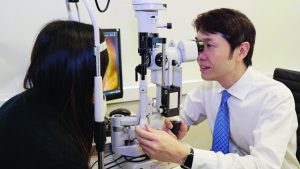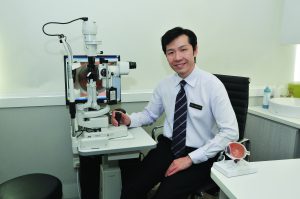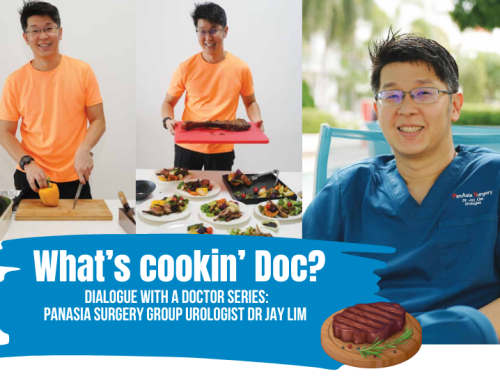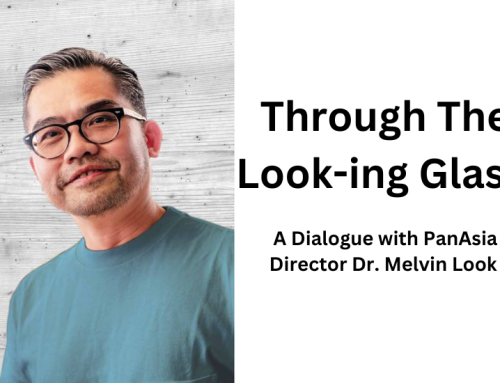Dialogue with A Doctor: Lang Eye Centre Medical Director, Dr. Leonard Ang

We are all familiar with the phrase: the eyes are the windows to the soul. We are also acutely aware that our eyes are our windows to seeing the world. Without this pair of vital organs, we would be missing out on a major way of experiencing the world around us. But our eyes can easily be damaged or deteriorated by our lifestyles or other means. This is why we spend a huge amount of effort, time and expense protecting and restoring our precious sight. We cannot and do not want to imagine a world where we cannot see well or worse, lose total sight. And many of us, even if we have never or rarely taken a hearing test or a taste sensitivity test, will have taken many eye tests in our time.
This issue’s Prime Interview Series interviewee is Dr Leonard Ang, Medical Director and Senior Consultant Ophthalmologist at Lang Eye Centre. Dr Ang is one of the most respected eye doctors in Singapore. With extensive experience training and working at various top eye centres around the world, an amassed 30 international and local scientific awards for his outstanding work in ophthalmology and a professional reputation for taking on difficult cases, Dr Ang’s authority and knowledge in his field of work is undisputed. When he talks about eye-care, we would do well to listen.
But like many other healthcare professionals, Dr Ang’s care for individual health and well-being extends beyond his areas of specialisation. In this interview, he shares with us some information and advice on how to stay healthy generally and also how to take care of our sight. So keep your eyes open for his invaluable advice and insights.
Thank you, Dr Ang, for giving us valuable time out from your busy schedule to take this interview. Let’s cut straight to the chase. Give us a brief on your beliefs on health and wellness.
DR LEONARD ANG: I think health and wellness are synonymous with maintaining a healthy lifestyle. There are many physical, mental and psychological benefits to leading a healthy life. A healthy lifestyle enhances a person’s overall well-being. I believe that there are six keys areas that can help to improve a person’s physical and mental health, and reduce the risk of premature death.
What are these six areas?
LA: A healthy diet; exercising and maintaining a healthy weight; mental health; managing stress; having sleep; and focusing on preventive health.
Let’s start with diet then: what should we take note about having a healthy diet?
LA: A healthy diet comprises a combination of different foods. We all know it is important to have a good balance of protein, fat, carbohydrates, fibre, vitamins and minerals in our diet to sustain a healthy body. The cornerstone of a healthy diet should be to replace processed food with real food whenever possible.
Some tips on what a healthy diet entails. First, a reduction in intake of fatty, oily or fried food. Although fats and oils are concentrated sources of energy, eating too much, particularly the wrong kinds of fat like saturated fats, trans-fats and cholesterol, can increase the risk of heart disease and stroke. Reduce the intake of food laden with these unhealthy fats. Instead, prepare food with unsaturated vegetable oils. This can help to reduce the risk of cardiovascular disease. Do take note of the healthy fats like omega-3 fats, which can be found in salmon. Taking these healthy fats may have beneficial effects on the body, such as protecting the brain and heart.
The carbohydrates we consume should ideally come from complex, unrefined carbs like wholegrains, cereals and oatmeal, rather than sugars and refined carbohydrates. Cutting back on refined or processed carbohydrates like white bread, pastries, starches and sugar can prevent rapid spikes in blood sugar, fluctuations in mood and energy, and a build-up of fat, especially around your waistline.
Next, protein intake should preferably be in the form of lean or white meat like chicken and fish, vegetable proteins including beans and nuts, and eggs. These have lower calories and fat content compared to red meat. And of course, you should always eat plenty of fruits, vegetables, wholegrains, nuts and beans. These are high in dietary fibre and are important sources of vitamins, minerals, plant protein and antioxidants. They can significantly lower the risk of obesity, heart disease, stroke, diabetes and certain types of cancer. It is good to have a serving of fruits and vegetables with each meal.
In terms of the undesirables, sweet snacks and sweetened drinks should be cut down or cut out. Taking more sugar may increase risk of cardiovascular disease, obesity, diabetes mellitus and tooth decay. Eating too much salt can increase the risk of hypertension or raised blood pressure, heart disease and stroke. Processed or unhealthy foods often have high fat or sugar content. These should be taken sparingly.
Finally, drink more water. Water offers the benefits of hydration, nourishment and improved well-being. It can cleanse toxins from the body, improve brain function, energize muscles, and balance the body temperature and fluids. Drink 6-8 glasses each day.
Wow, that is a lot of information to digest! What about exercise and weight management?
LA: Exercise is a great way to stimulate your health. It improves your overall health and well-being, and reduces the risk of serious health conditions. Obesity is associated with an increased risk of diabetes, heart disease, stroke and certain cancers. Studies have shown that physical activity helps to improve longevity and overall health.
Ideally, regular exercise would involve at least 30 minutes per day of moderate to vigorous activity. However, in reality, this is often challenging for many of us, having to balance work commitments and family responsibilities. Perhaps, trying to engage in regular exercise for at least 30 minutes for 3 times per week may be a more realistic and achievable goal. Physical activities could involve running, aerobics, dancing or calisthenics exercises like push-ups, crunches and core exercises to strengthen different parts of the body. Pick a convenient time to schedule your workout. You should enjoy your workout and not feel like it is a chore.
That sounds manageable. Looking at your next two factors, mental health and stress management, they deal with mental and psychological well-being. Despite greater public awareness, mental well-being is still an area people do not like to wade into.
LA: When it comes to maintaining a healthy lifestyle, people often concentrate on the physical aspects of health and ignore the mental health aspects. Mental health is a foundation of a person’s overall health. Good mental health is necessary to maintain and develop cognitive abilities, social relations, and for coping with the personal and professional challenges of daily life.
If you feel negative towards others, this could cause more unhappiness at work, school or in your social life. Some ways that you can improve your mental health include maintaining a positive attitude in life, socializing with loved ones and friends, and doing something creative. Positive thinking involves feeling confident and good about yourself, setting goals and working towards it, and never letting something get you down.
Likewise, amidst the hustle and bustle of work and family life, there are often situations at work or at home that can lead to you feeling stressed or under pressure. Stress is part and parcel of life. This may come from work, family, social or personal activities. Stress can wreak havoc on your emotional well-being and physical health if it is not appropriately managed. It can cloud your ability to think clearly and function effectively. Effective stress management helps you to break the hold stress has on your life, so you can be happier, healthier and more productive.
Sometimes it is beneficial to stop, take a deep breath and relax. Manage the stressful event by changing your expectations and attitude. You can break down daunting tasks into smaller manageable components, and approach the task at hand with a positive mindset and cultivate the confidence that you can succeed; while accepting the fact that some things are beyond your control. This can change your perspective of the task at hand so that each stressful task becomes an opportunity to succeed.
During periods of stress, try some relaxation activities to help you relax, which may include meditation, listening to music, reading, watching a comedy, exercising or meeting up with friends. These activities can help you to destress, feel calmer and happier.

What are some good practices with regards to sleep and preventive health ?
LA: Firstly, having sufficient good quality sleep will help you rest, rejuvenate, and be more revitalised and energetic the next day. Conversely, insomnia may increase the risk of high blood pressure, heart disease, mental and endocrine diseases. It is therefore necessary to sleep well and for an adequate number of hours, preferably at least 8 hours a night.
Going for regular health screening is another important component of staying healthy and fit. Many diseases, such as cancers and cardiovascular diseases, can be prevented through leading healthy lifestyles. However, there are also many other diseases that may not be preventable and regular screening is important to diagnose these diseases at an early stage. This allows early intervention and treatment of these diseases which can significantly improve the outcome for patients.
Thank you for these helpful tips on general health. Let’s focus on your area of expertise now: the eyes. Going back to diet, what are some recommended food or drinks that can help to improve and maintain good eye health?
LA: Green leafy vegetables such as spinach and kale are packed with lutein and zeaxanthin, which are antioxidants that lower the risk of developing macular degeneration and cataracts. These are good. Similarly, carrots and other orange-coloured fruits and vegetables promote eye health and protect vision. They contain beta-carotene, a type of vitamin A that gives these foods their orange hue. Beta-carotene helps to promote the health of the retina and other parts of the eye. Other vitamins that have some antioxidant effect and would be useful for the retina include vitamins B, C and E.
Egg yolk is another good source of lutein and zeaxanthin plus zinc, which helps to reduce your macular degeneration risk. Other good foods for the eyes include fatty fish such as tuna and salmon. They are rich in oils and fatty acids that may help in the production of tears to help alleviate dry eyes. Then there are citrus, berries, nuts and beans which contain vitamins that have been shown to reduce the risk of developing macular degeneration and cataracts.
You can also consider taking supplements which contain the various components I just described. Purchasing multivitamins would be more cost-effective and convenient compared to buying each vitamin and nutrient separately.
What about other things that we can do to manage and protect our eye health?
LA: You can take care of your eyes and improve eye health by doing the following: protecting your eyes from the sun and ultraviolet exposure with protective sunglasses; having a healthy diet of green leafy vegetables, fresh fruits, fish and eye supplements; avoiding smoking; having regular exercise; controlling any cardiovascular diseases like hypertension and diabetes; and taking breaks to rest the eyes during prolonged work.
 Finally, any advice for eye patients who may worry about their eye disease(s) or condition?
Finally, any advice for eye patients who may worry about their eye disease(s) or condition?
LA: Eye disease treatment is extremely advanced now and we can successfully treat many of the blinding eye conditions safely and effectively. When diseases are detected and treated early, they are more likely to achieve a better result. Delaying treatment often prolongs the treatment and recovery, and sometimes the damage may be permanent.
Patients should seek medical attention early when they develop eye symptoms, especially if they are severe or persistent. As many potentially blinding eye conditions start off gradually with mild symptoms, patients often only seek treatment when the disease is fairly advanced. By which time, the damage may be irreversible.
A common eye disease which everyone will develop as they grow older is cataract, which is the commonest cause of blindness in the world. The good news is that modern cataract surgery is extremely safe and effective. It is essentially a painless procedure and patients can enjoy a relatively fast recovery. Cataracts can be removed when it starts to interfere with a person’s lifestyle, and patients need not wait for it to be very severe or the vision to be very bad before removing it. With new and improved lenses, cataract surgery can help to correct all the refractive errors in the eye and reduce a person’s need for glasses, thereby improving their quality of life. Other common diseases like glaucoma and retinal diseases can also be effectively treated if they are diagnosed early. Advances in the treatment of eye diseases have significantly improved the outcome of these conditions.
A healthy diet comprises a combination of different foods. We all know it is important to have a good balance of protein, fat, carbohydrates, fibre, vitamins and minerals in our diet to sustain a healthy body
Therefore, I would advise patients to undergo eye screening from the age of 45 to detect early eye disease. Eye screening and regular eye examination by an eye specialist could help to detect potentially serious eye conditions, treat it early and preserve one’s vision.
To round up, what parting advice do you have for us, busy urbanites, to lead a healthy and balanced life?
LA: People often have many commitments and activities in their daily life, such as work, family and social activities. It is challenging trying to balance all these activities and commitments, while also finding time to exercise, eat healthily and have adequate rest. More often than not, we tend to overlook these aspects and neglect our health, and end up putting on weight or feeling tired.
I believe we need to make a conscious and deliberate effort to set aside time to carry out activities that maintain our health. The ultimate goal is a more balanced life, with time for work, family, relationships, relaxation and fun, as well as the resilience to hold up under pressure and meet life’s challenges head on. This will lead to a happier, healthier and more fulfilling life.











